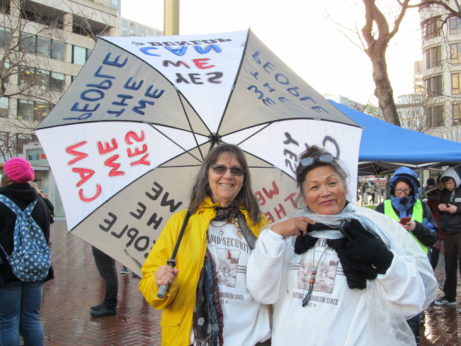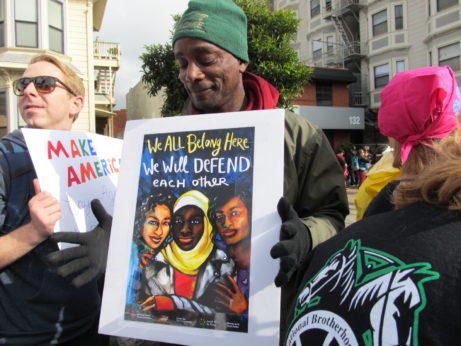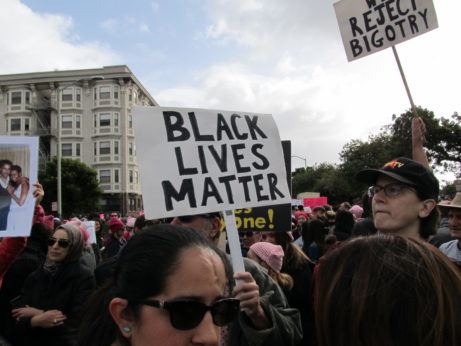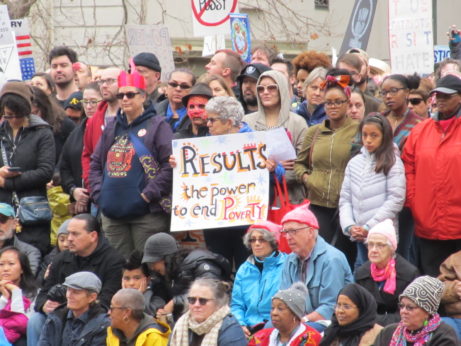
OAKLAND, Calif. – One of California’s largest Women’s Marches took place here on Jan. 21, drawing a crowd estimated by mainstream media at 100,000. Like other marches around the country, this one was joined by participants from a broad range of movements, from Black Lives Matter and immigrant rights to climate, faith communities, LGBTQ rights, a woman’s right to choose, the Fight for $15, upholding the Affordable Care Act, Social Security and Medicare, and much more.
As starting time approached, marchers in an upbeat, fight-back mood jammed the streets for many blocks around. The iconic pink “pussy hats” abounded – many crafted by the women wearing them. Some men sported the hats as well.
Among participants were the young and old and everyone in between, marchers with disabilities, people of all colors, among them many men.
Many had encountered long delays on their way, with trains and buses crammed to capacity despite transit systems adding extra runs to their schedules. And after the rally people in pink hats could be seen throughout the downtown business district and around nearby rapid transit stations.
Oakland’s numbers were even more outstanding considering that the demonstration was one among several in other Bay Area communities, among them San Jose at 30,000, San Francisco with 150,000, Santa Cruz at 15,000, Walnut Creek with 10,000, Berkeley at 1,000, and Albany at 500. Of course, no march in the Bay Area topped the 750,000 turnout in Los Angeles, the country’s largest outside of Washington DC. The Sacramento Bee estimated afterwards that even conservative estimates showed almost one in 45 California residents participated.

After processing up the side of Lake Merritt, marchers wound down Grand Avenue before heading to the center of the city, where as many as possible crowded into the plaza and amphitheater in front of City Hall. Observers said the march stretched for as many as 40 blocks.
Once at the plaza, protesters cheered and applauded as speaker after speaker from across the spectrum of movements called on them to carry forward a broad, united, persistent and courageous movement for positive change, fighting back against racism, misogyny, attacks on immigrants and militarism, and at the same time upholding vital human services, climate protection and the rights and needs of ordinary people.
Oakland’s mayor, Libby Schaaf, told the crowd, “As the only big city mayor in California who is a woman, I have a strong personal feeling about this new reality … I stand here today with my mother and my daughter, to show my gratitude for the past generations who have fought for my rights, and my hope for the future.”

Schaaf declared, “We will fight for women’s rights in a way that advances all rights.” Noting that Oakland, like many California communities, is a sanctuary city, she pledged “to do everything in my power to protect our planet, our people and our values.” She then asked rally participants to join hands and raise them above their heads, signifying unity “as a single fabric of this entire nation today.”
Among speakers was Elaine Brown, who headed the Black Panther Party for several years in the 1970s, and is active in community movements here, including prison rights and projects to help formerly incarcerated people re-enter their communities.
“I’m going to say, Power to the People – it’s time to get on up and recognize who Trump is,” Brown told the crowd, “and that he is not new. We have been asleep.”

Drawing parallels between the new president and Adolph Hitler, Brown called on people “who hold progressive, humane and even revolutionary views” to carry forward struggles for Latino, black, gay and women’s rights, and to “launch a fight for the survival of ordinary people whose industrial jobs are dying every day with the rise of technology.”
West Oakland activist Iris Corina called on the crowd to join her in singing the civil rights anthem, We Shall Overcome, and declared, “Don’t let this march be a game. Go back into your communities and raise awareness and encourage hope … If you want to find out how to make changes, how to hold politicians’ feet to the fire that’s stoked here today, you’ve got to get involved with your community.”
Environmental activist Tom Steyer and area state Senator Nancy Skinner also urged participants to help build a powerful, ongoing, unified people’s movement.
The largest Bay Area march was held later in the day in San Francisco, and even a cold rain couldn’t dampen the enthusiasm of the crowd of more than 150,000. In her speech, SF Supervisor Jane Kim pointed out that the other five women supervisors were also present, while folk singer/activist Joan Baez inspired the crowd as they began to surge down Market Street toward Justin Herman Plaza. Observers reported that it took marchers two hours to pass by a key downtown intersection.

In an Inauguration Day letter to Californians, state Assembly Democrats pledged they would “continue to honor our commitments to the people of California. The California contract is a promise to ourselves and to one another that we will build a sustainable econ9my, environment and society that doesn’t just protect the wealthy or the powerful, but instead will be benefit every Californian and benefit from every Californian.”
Their letter specifically listed goals in transportation, affordable housing, education funding, good jobs with the right to organize, clean air, justice that protects all without abuses, affordable health care accessible to all, protection of retirement security, government transparency, and a welcome to all residents including immigrants and refugees.










